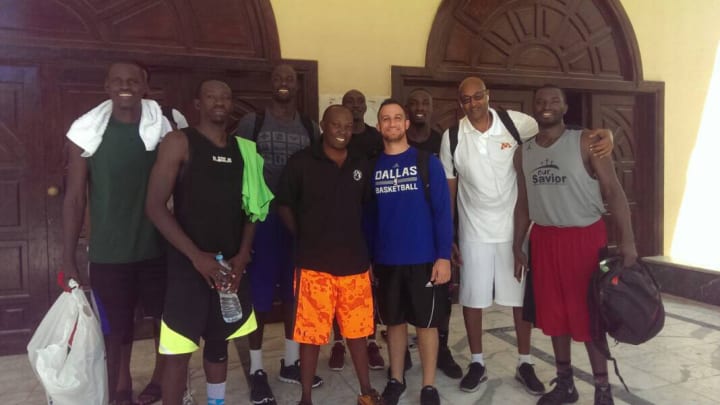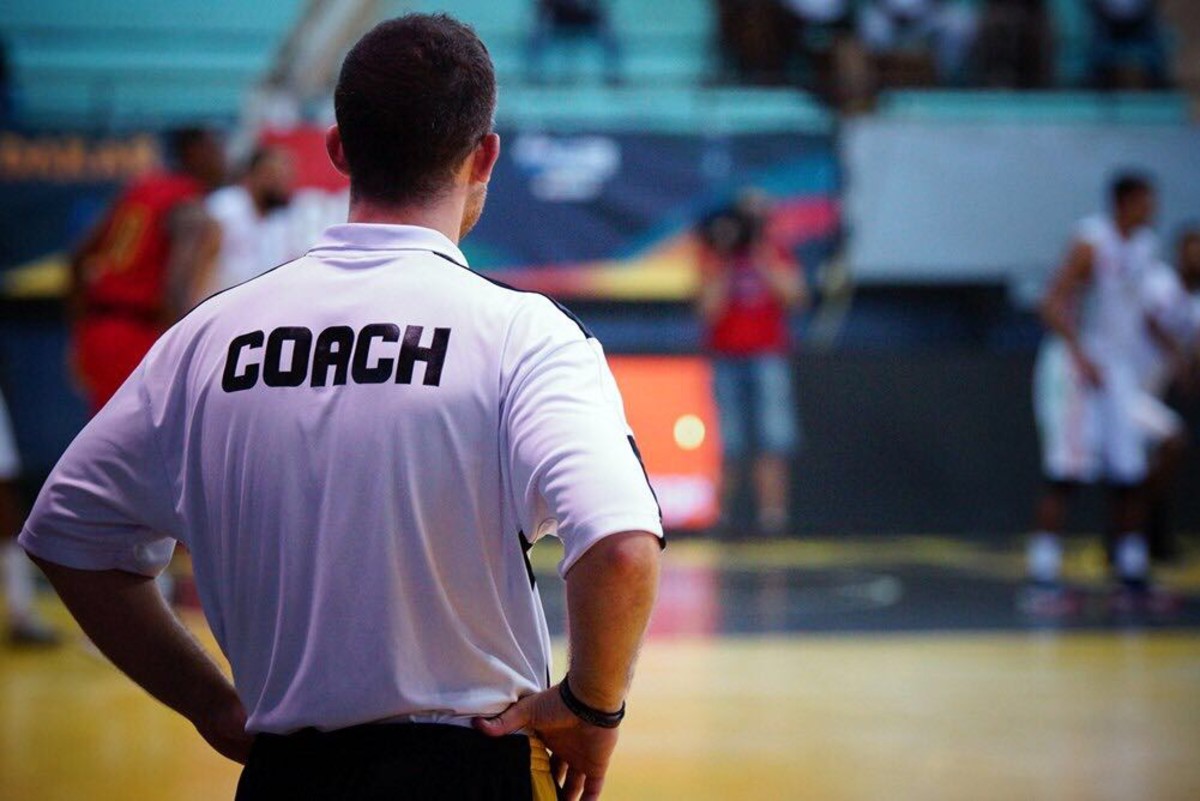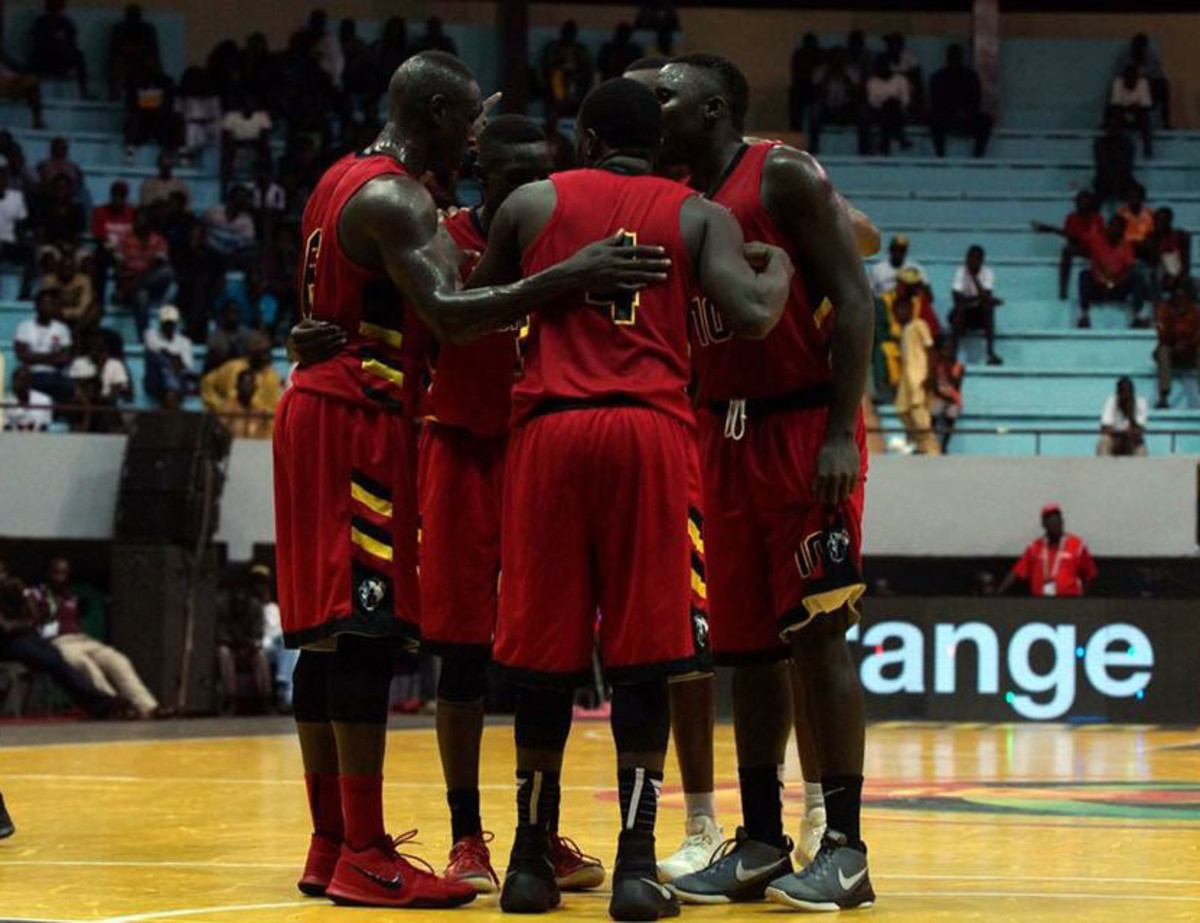George Galanopoulos's Unlikely Journey From Basketball Dreamer to Uganda Head Coach

Darkness flooded the court. There was no air conditioning to combat the triple-figure humidity. The lights would never flicker back on. No clock hung on the walls. Yet with just seven days remaining before the 2017 AfroBasket tipped in Senegal that Sept. 8, the Uganda men’s basketball team needed every minute of its scheduled two-hour practice time. And the program's players, unified by nationality yet boasting zero official practice gear, began defensive shell drills in the dead of night.
“It was the worst gym I had ever seen,” recalls the team’s head coach, George Galanopoulos. The nondescript building in Alexandria, Egypt, did provide the perfect metaphor for Team Uganda’s plight. “Things aren’t going to go our way in games. Nobody’s gonna feel sorry for us,” Galanopoulos preached to his players. “This is the hand we’re dealt. We just gotta roll with this.”
Kevin Durant and the Dagger That Foreshadowed the Broom
The 29-year-old has been tasked with resurrecting Uganda’s program, moonlighting as the national team's head coach while churning hours in Dallas as part of the Mavericks’ video team. Uganda’s entire group meets in Istanbul this week for this summer’s minicamp—and a series of exhibition games—leading up to the African 2019 FIBA World Cup Qualifiers’ second leg in Nigeria from June 29–July 1. “Coach George is not thinking about boxing us into the top five in Africa,” says Stanley Ocitti, a former Uganda player and current FIBA agent. “He’s thinking, why can't we be one of the top teams in the world?”
That once-farcical goal now feels somewhat attainable. After all, Uganda’s path to international success is far simpler than the journey that delivered its 5’10” Chicagoan head coach of Greek descent. Galanopoulos hails from Buffalo Grove, Illinois, 40 minutes north of the Windy City. When he was five years old, Galanopoulos’s father, Dean, plunged a hoop into the earth alongside the family’s sloping driveway, a surprise gift of epic proportions. His young son hoisted jumpers day and night, especially after Dean added an overhead light, ironically, to allow hooping late into moonless evenings. The swift decline of the driveway posed difficult angles to the rim, giving Galanopoulos an incredible home-court advantage in HORSE contests.
Those early hoop dreams quickly manifested into any Bulls junkie’s fantasy. Through a family friend, Galanopoulos landed a summer internship with Chicago’s player development staff as a sophomore at Indiana. He chased rebounds and played mock defense during a rookie Derrick Rose’s offseason workouts at the fabled Berto Center. “I was pinching myself every single day that I walked into that place,” he says.

Following graduation, Galanopoulos secured a basketball operations internship with the Bakersfield Jam for the 2011–2012 season, fleeing the Midwest for California. The Jam’s new coaching staff went out one evening to get acquainted with their new colleagues. Within an hour, Galanopoulos was belting karaoke. “He breaks all the ice and melts everything down,” says Brian Levy, general manager of the Fort Wayne Mad Ants, then the Jam’s director of player personnel. During a seven-hour drive to Phoenix for a D-League open tryout, his enthusiasm kept coaches awake, telling neverending stories while crammed inside a stuffy van. When someone dozed, they’d fall victim to his pranks. “He’s got an infectious personality,” Levy says.
That energy further bloomed when he hit the court. Four players made Bakersfield’s roster out of open tryouts, and craving as much skillwork as possible, rang Galanopoulos around the clock, desperately enlisting a rebounder to fire as many shots before the sun rose. Beyond holding the short straw as the youngest member of the Jam, Galanopoulos quickly became the staffer those hopefuls wanted with them in the gym. “Players get labeled as ‘glue guys,’” says Levy. “George was one of those ‘glue’ members on the staff. It didn’t take him very long to have an inside joke or a handshake.”
The Jam created a player development coach position for Galanopoulos the following season. Mike Schmitz, now a draft analyst for ESPN, joined the staff as a video coordinator and roomed with him for ‘12–13. They’d cut film and assist players past midnight, retreat back to their two-bedroom in nearby Oildale, Calif., and return to the Jam facilities by 6 a.m. The schedule never sapped Galanopoulos’s zeal. “You want to work hard when you’re with him because he grinds and he’s gonna hold you accountable and he wants to win,” Schmitz says. The Jam claimed a team-record 36 games that season, the top mark in the Western Conference.
Bakersfield promoted Galanopoulos to an assistant coach the following campaign. But by season’s end, the Phoenix Suns purchased the Jam in April 2014 and wiped the staff for their own personnel. Galanopoulos then ventured overseas to coach in New Zealand’s NBL, returning to the States the following March hungry for another opportunity in the NBA. Having previously interned under Mike Procopio at legendary trainer Tim Grover’s Attack Athletics in Chicago, Galanopoulos reconnected with his old boss, now a player development coach with the Mavericks spearheading their expansive internship program. Procopio minted Galanopoulos as one of the Mavs’ 12 player development interns for the ‘15–16 season.
2018 NBA Mock Draft 9.0: Trade Speculation Heats Up
Galanopoulos purposely lived within a five-minute walk of Dallas’s practice facility, able to service players around the clock just as he did with the Jam. He imitated opposing defenders and efficiently rebounded for players spraying shots like he learned with the Bulls. “He did a great job of not becoming pesty, but also not blending in,” says former Mavs assistant Melvin Hunt, now with Atlanta. Galanopoulos harbored a rare confidence to debate coaching philosophy with Dallas’ full-time coaches. He unabashedly shared beliefs on age-old topics amongst coaching circles, like attacking two-for-one situations at the end of quarters and fouling when up three points at the end of games.
“He’ll throw his opinion out there and tell you why,” Hunt says. “Anytime you have a base of how you see the game, you can kind of go from there. The next steps are easy. You can figure it out. If you don’t have your philosophy, then you’re all over the board.”
Dallas retained Galanopoulos throughout the summer, just as the Mavericks hired former LA Defenders head coach Bob MacKinnon to lead their own now G-League outfit, the Texas Legends. MacKinnon had battled Galanopoulos's Jam teams throughout the ‘13–14 season, and—remembering the youngster’s passion and Bakersfield’s preparation—hired him as a Legends assistant coach during Las Vegas Summer League.

Fast-forward to the subsequent March, MacKinnon summoned Galanopoulos into his office near the end of a successful ‘16–17 season. MacKinnon had recently ran pick-up at his local YMCA back home in Chapel Hill, N.C., when a lanky African man approached him in between runs. Ocitti, a former Uganda player now residing in North Carolina for his wife’s work, recognized Mackinnon’s face from connecting on LinkedIn. In 2015, his country had qualified for AfroBasket for the first time, and in hopes of furthering their legitimacy, Uganda required a head coach with NBA experience. MacKinnon would be out of commission, years of running marathons had finally forced him to undergo hip replacement surgery that offseason. But the veteran employed a fiery, bright pupil ripe for the opportunity. Galanopoulos could iron the many wrinkles in Uganda’s available Synergy clips and YouTube footage. Uganda consistently lost by 40 points. “I knew he’d have great attention to detail,” MacKinnon says. “I knew he would get them, at the very least, organized.”
They flew back to Chapel Hill and met with Ocitti and Uganda’s GM Mohamed Santur at a downtown Pizzeria Uno. Galanopoulos oozed his trademark charisma. “I think once he’s involved with something, he kind of has a crazy passion about it where he just focuses all his attention on doing the best job possible,” Ocitti says. Soon enough—with Mavericks GM Donnie Nelson’s blessing—Galanopoulos walked into that dingy Egyptian gym. While Uganda lacks in talent relative to other African teams, its players quickly adopted their new coach’s verve and and professionalism. Uganda’s team bus now departs promptly. Players who arrive a minute late are left behind, and those players who don’t make practice simply won’t play.
Embraced by a Home Away from Home, Moritz Wagner Is Finally Ready for a New Challenge
At AfroBasket, the national team first drew historically dominant Angola, which had dropped Uganda, 98–44, in the previous FIBA Africa Champions Cup. Yet under their new coach, point guard Robinson Opong drained a three-pointer with 51.5 seconds remaining to give Uganda an 84–79 advantage. “Holy shit,” Galanopoulos thought. “We’re going to beat Angola!” Only the rival marched back down the floor, Yanick Moreira responding with an and-one layup. He missed the free throw, but the ball trickled out of bounds and Angola maintained possession. A game-tying triple pierced the net moments later, Galanopoulos’s heart sank into his gut, and ultimately, Uganda fell in overtime. They lost by three to Central Africa the following day, and then to Morocco by nine, yet the progress was undeniable. “I thought it was a success considering where the team came from,” Galanopoulos says.
He returned home and joined the Mavericks’ video team for the ‘17–18 season. Committed to Dallas, Galanopoulos missed Uganda’s first leg of the World Cup Qualifiers in February. His team fell to Nigeria, 102–86, lost to Mali on a devastating buzzer-beater, and then triumphantly vanquished Rwanda, 79–63, collecting the first victory of the Galanopoulos era. Despite his absence, his teachings persisted. “He’s getting his guys to play really, really hard and that’s kind of his M.O., it reflects who he is,” says Schmitz, who will join Uganda as an assistant in late June. With the victory and the point differential tiebreaker, Uganda currently sits in second place of the tournament’s Group B. Helping matters, the team has bolstered its frontline with 6’8” North Dakota redshirt sophomore Deng Geu. Should they remain in the top three of their pool, Uganda and Galanopoulos will advance to the third leg, when 12 African teams vie for the continent’s five spots amongst the 32-team FIBA World Cup next summer. “There’s a country hoping he does well,” Hunt says. “That’s a special kind of pressure.”

Galanopoulos’s coaching odyssey has spanned the entire globe and all levels of basketball, yet incidentally assuming charge of Uganda’s program may one day prove a unique backdrop to an emerging head coach in the NBA. In interviewing young assistants, teams are persistently searching for candidates with previous leadership experience. “There’s gonna come a day when it pays off for him,” Hunt says. “Somebody is going to take a chance on him because he’s led a group. George is checking the box.” The Phoenix Suns recently handpicked former Utah Jazz assistant Igor Kokoškov after nearly a decade piloting Georgia and Slovenia’s respective national teams. For now, Galanopoulos remains focused on leading Uganda’s rise to African basketball prominence and immersing himself within his players’ culture. “You realize it’s so much more than something to put on your resume,” he says. Besides, Uganda winning the African Qualifiers would be etched in indelible history books far grander than any CV.
